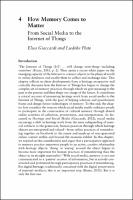Chapter 4 How Memory Comes to Matter
Proposal review
From Social Media to the Internet of Things
| dc.contributor.author | Giaccardi, Elisa | |
| dc.contributor.author | Plate, Liedeke | |
| dc.date.accessioned | 2021-02-02T15:01:56Z | |
| dc.date.available | 2021-02-02T15:01:56Z | |
| dc.date.issued | 2017 | |
| dc.identifier | ONIX_20210202_9781315472164_chpt_28 | |
| dc.identifier.uri | https://library.oapen.org/handle/20.500.12657/46476 | |
| dc.description.abstract | Memory matters. It matters because memory brings the past into the present, and opens it up to the future. But it also matters literally, because memory is mediated materially. Materiality is the stuff of memory. Meaningful objects that we love (or hate) function not only as aide-mémoire but are integral to memory. Drawing on previous scholarship on the interrelation of memory and materiality, this book applies recent theories of new materialism to explore the material dimension of memory in art and popular culture. The book’s underlying premise is twofold: on the one hand, memory is performed, mediated, and stored through the material world that surrounds us; on the other hand, inanimate objects and things also have agency on their own, which affects practices of memory, as well as forgetting. Chapter 1 of this book is freely available as a downloadable Open Access PDF under a Creative Commons Attribution-Non Commercial-No Derivatives 3.0 license. https://s3-us-west-2.amazonaws.com/tandfbis/rt-files/docs/Open+Access+Chapters/9781138203235_oachapter1.pdf Chapter 4 of this book is freely available as a downloadable Open Access PDF under a Creative Commons Attribution-Non Commercial-No Derivatives 3.0 license. https://s3-us-west-2.amazonaws.com/tandfbis/rt-files/docs/Open+Access+Chapters/9781138203235_oachapter4.pdf Chapter 5 of this book is freely available as a downloadable Open Access PDF under a Creative Commons Attribution-Non Commercial-No Derivatives 3.0 license. https://s3-us-west-2.amazonaws.com/tandfbis/rt-files/docs/Open+Access+Chapters/9781138203235_oachapter5.pdf | |
| dc.language | English | |
| dc.relation.ispartofseries | Routledge Research in Cultural and Media Studies | |
| dc.subject.classification | thema EDItEUR::J Society and Social Sciences::JB Society and culture: general::JBC Cultural and media studies::JBCT Media studies | en_US |
| dc.subject.classification | thema EDItEUR::J Society and Social Sciences::JH Sociology and anthropology::JHM Anthropology::JHMC Social and cultural anthropology | en_US |
| dc.subject.classification | thema EDItEUR::A The Arts::AB The arts: general topics | en_US |
| dc.subject.other | anthropology | |
| dc.subject.other | archaeology | |
| dc.subject.other | cultural studies | |
| dc.subject.other | heritage | |
| dc.subject.other | material culture | |
| dc.subject.other | media studies | |
| dc.subject.other | memory studies | |
| dc.subject.other | trauma | |
| dc.subject.other | visual culture | |
| dc.title | Chapter 4 How Memory Comes to Matter | |
| dc.title.alternative | From Social Media to the Internet of Things | |
| dc.type | chapter | |
| oapen.relation.isPublishedBy | 7b3c7b10-5b1e-40b3-860e-c6dd5197f0bb | |
| oapen.relation.isPartOfBook | 5395676a-63e8-4eab-86d6-eaaa3366dd22 | |
| oapen.relation.isPartOfBook | 5395676a-63e8-4eab-86d6-eaaa3366dd22 | |
| oapen.imprint | Routledge | |
| oapen.pages | 24 | |
| peerreview.anonymity | Single-anonymised | |
| peerreview.id | bc80075c-96cc-4740-a9f3-a234bc2598f1 | |
| peerreview.open.review | No | |
| peerreview.publish.responsibility | Publisher | |
| peerreview.review.stage | Pre-publication | |
| peerreview.review.type | Proposal | |
| peerreview.reviewer.type | Internal editor | |
| peerreview.reviewer.type | External peer reviewer | |
| peerreview.title | Proposal review | |
| oapen.review.comments | Taylor & Francis open access titles are reviewed as a minimum at proposal stage by at least two external peer reviewers and an internal editor (additional reviews may be sought and additional content reviewed as required). |

